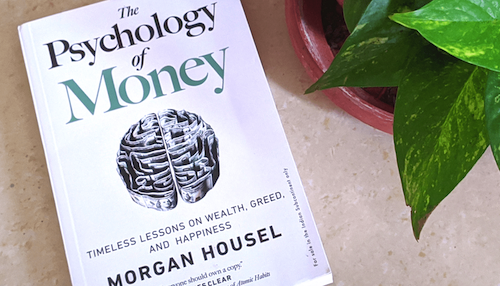Behavior Beats Brains — and 6 other takeaways from ‘Psychology Of Money’
Valuable lessons that will drastically impact how you view and interact with money.

I try to live with no regrets, but if I could go back and give 20-year-old Charlotte some advice, it would probably be this:
be — smart — about — your — money.
I’ve been lucky enough to live and work in Singapore and New York in my twenties. Great cities, but as you can imagine, not the most conducive environments for building strong saving habits. I remember realising I had no idea how much I was spending or saving each month (if anything), and that started to feel sliiiiightly irresponsible. So when I turned 30, I decided to become more intentional about money and how I spend it. That meant actively tracking my budget, setting monthly saving goals and looking into investing.
Since then, one of the books I read that had a big impact on me is Psychology Of Money by Morgan Housel. No matter which stage in life you are in, I think you will learn some valuable lessons from reading this book:
- In your twenties — to realise the importance of saving and investing as early as possible
- In your thirties — to reflect on the kind of lifestyle you want and what truly matters
- In your forties (and up) — to be reminded of the importance of knowing when you have ‘enough’

The book is short and easy to read, structured around 19 short stories that break down the psychology behind why people spend, save and invest differently. Heads up: this is not meant to be an advanced finance book. The ideas are not groundbreaking, as you’ll see in this post, but that’s exactly Morgan’s point: personal finance does not need to be more complicated than this. How you behave is more important than what you know. Behavior Beats Brains. By keeping in mind these basic ideas, you will be able to drastically impact how you interact with money, which will benefit you for the rest of your life. And the sooner you start, the better.
I’ve summarized the ideas in the book that resonated most with me, with my own learnings and thoughts interweaved. There’s much more in the book, specifically around investing and long-term planning so give it a read if you want to learn more.
One thing to keep in mind: I’ll often mention wealth. Don’t confuse this with being rich. I am not talking about being a millionaire and never having to work again. I am talking about never having to worry about money. About being independent, having savings and living a comfortable, good life.
1. How You Behave Is More Important Than What You Know
Morgan starts the book with 2 big statements:
- Financial outcomes are mostly driven by luck, independent of intelligence and effort.
- Financial success is not a hard science. It’s a soft skill, where how you behave is more important than what you know. This soft skill is the psychology of money.
Doing well with money has a little to do with how smart you are and a lot to do with how you behave. And behavior is hard to teach, even to really smart people. A genius who loses control of their emotions can be a financial disaster.
The opposite is also true. Ordinary folks with no financial education can be wealthy if they have a handful of behavioral skills that have nothing to do with formal measures of intelligence.
Number 2 is an important mindset shift. Morgan states that we think about and are taught about money in ways that are too much like physics (with rules and laws) and not enough like psychology (with emotions and nuance). It’s an important distinction because it means that finance and creating wealth is something that almost anyone can understand and learn, no matter your background, upbringing, education or intelligence. Don’t be discouraged if you don’t have wealthy parents or don’t have a high paying job. Of course, no one can deny that it helps massively, but it is not the only path to nor guarantee for long-term wealth.
2. No One Is Crazy
Morgan says that while people might do crazy things with money, no one is crazy.
Here’s the thing: People from different generations, raised by different parents who earned different incomes and held different values, in different parts of the world, born into different economies, experiencing different job markets with different incentives and different degrees of luck, learn very different lessons.
Your personal experiences with money make up 0.00000001% of what’s happened in the world, but 80% of how you think the world works.
The lesson here is to play your own money game and not get too caught up with what everyone else is doing. Don’t judge people and how they spend their money either. We all make decisions based on our own unique experiences that make sense to us in a given moment.
I had an older family member express concern about the risks of robo-investing and digital investing platforms. He recommended I go to our local bank to discuss my investment options, perhaps invest in some bonds. I decided that did not work for me, so I went in another direction. I’m not saying I am right or wrong, but it is important to do your own research and thinking and make your decisions from there. By all means, ask people’s advice, but take it with a grain of salt and remember that everyone is playing a different game based on their own experiences.
3. When Is Enough, Enough?
Morgan claims the hardest but most important financial skill is getting the goalpost to stop moving.
If expectations rise with results, there is no logic in striving for more because you’ll feel the same after putting in the extra effort. It gets dangerous when the taste of having more — more money, more power, more prestige — increases ambition faster than satisfaction.
Social comparison is the issue. Yet, the ceiling of social comparison is so high that virtually no one will ever hit it. There will always be someone who has more than you. This means it’s a battle that can never be won, or that the only way to win is to not fight to begin with — to accept that you might have enough, even if it’s less than those around you. Comfortably living below what you can afford, without much desire for more, removes a tremendous amount of social pressure that too many of us subject ourselves to.
In my early thirties, I am in a phase where I am trying to build my career and investments. While I want to be ambitious and leave no opportunities on the table, I like to do the exercise of reflecting on what a comfortable life means to me. What does that look like exactly? How much will I need each month to achieve that? What are my priorities: a house? Travel? Saving for investments? I want to ensure I live life on my own terms and avoid getting stuck in a cycle of having to earn more and more just to keep up with a lifestyle I struggle to afford or want.
4. Confounding Compounding
Did you know that $81.5 billion of Warren Buffett’s $84.5 billion net worth came after his 65th birthday?
Warren Buffett is one of the best and most well-known investors in the world. One of the things that do not get mentioned often is that he started investing when he was 11 years old. His skill is investing, but his secret is time.
Compound interest is the interest you earn on the money you’ve saved or invested, but also the interest you’ve earned on your interest. It’s your money making more money. It makes sense, yet because of the time it takes to show results, it can be difficult to appreciate how powerful it can be.
Morgan writes that the counterintuitiveness of compounding may be responsible for the majority of disappointing trades, bad strategies, and successful investing attempts.
You can’t blame people for devoting all their effort to trying to earn the highest investment returns. It intuitively seems like the best way to get rich. But good investing isn’t necessarily about earning the highest returns, because the highest returns tend to be one-off hits that can’t be repeated. It’s about earning pretty good returns that you can stick with and which can be repeated for the longest period of time. That’s when compounding runs wild.
The learning here is simple: start saving and investing as early as possible. These days you don’t really have an excuse not to. Digital platforms have made it incredibly easy, and you only need a little bit to get started. Pick a couple of well-known low-cost index funds and invest a small amount every month. Just make sure it’s money you don’t need for the foreseeable future so you can leave it for years and let compounding do its magic.
5. Getting wealthy Is Not The Same As Staying Wealthy
Morgan makes a clear distinction between getting money and keeping money.
Getting money requires working hard, taking risks, being optimistic, and putting yourself out there.
Keeping money requires the opposite of taking risks. It takes humility and fear that what you’ve made can be taken away from you just as fast. This requires frugality and an acceptance that at least some of what you’ve made is attributable to luck, so past success can’t be relied upon to repeat indefinitely.
This is true for investing as well as for earning money. You might make a good salary now, but you shouldn’t assume this will always be the case.
Morgan suggests adopting a survival mentality when it comes to keeping money, which comes down to appreciating these three mindsets:
- Financial long-term stability is more important than big returns. The irony is, the more stable you are, the more likely you are to get the biggest returns because you’ll be able to stick around long enough for compounding to work wonders.
- Planning is important, but the most important part of every plan is to plan on the plan, not going according to plan. Embrace and allow room for error. This comes in many forms: a frugal budget, emergency savings, a loose timeline.
- Be optimistic about the future but paranoid about what will prevent you from getting to the future. Believing that the odds are in your favour and over time things will balance out to a good outcome, even if what happens in between is filled with ups and downs.
Be patient. Be flexible. Be humble.
6. Freedom To Control Your Time Is the Highest Dividend Money Pays
The ability to do what you want, when you want, with who you want, for as long as you want, is the ultimate freedom. Being able to wake up and change what you’re doing, on your own terms, whenever you’re ready. That’s what money can buy. It can’t buy happiness or health.
Morgan says that money’s greatest intrinsic value is its ability to give you control over your time. A small amount of wealth means being able to wait for a good job to come around after you get laid off, rather than having to take the first one you find. It means being able to quit your job if you no longer enjoy it because you know you have savings to tide you over.
This has been one of the biggest mindset shifts for me. I never want to be a slave to money, my paycheck or my possessions. I never want to be scared to leave a job I don’t enjoy because of money. I want to work hard to achieve the independence that will allow me to live comfortably, travel and work on projects I am passionate about. It’s only been the last year or so that I am starting to see that a future like this is not just for the lucky few. Getting this level of independence does not rely on earning a high income. It’s mostly a matter of keeping your expectations in check and living below your means.
People who live far below their means enjoy a freedom that people busy upgrading their lifestyles can’t fathom. — Naval Ravikant
7. Take Control Of Your Savings
The way Morgan frames saving money in the book is very empowering and optimistic. He says that building wealth has more to do with your savings rate than your income or investment returns.
Investment returns can make you rich. But whether an investing strategy will work, and how long it will work for, and what will happen in the global economy, is out of your control.
Rising salaries and promotions are not guaranteed and not entirely within your control either. My salary was cut for a few months during the pandemic, which I could have never foreseen or planned for.
Personal savings and frugality are parts of the money equation that are more in your control and have a 100% chance of being as effective in the future as they are today.
If you view building wealth as something that will require wealthy parents, a higher salary or big investment returns, you will feel like it will be too difficult and out of your control. If you view it as powered by your own frugality and efficiency instead, it becomes possible.
For almost 2 years now, I have been tracking all my expenses. I take a few minutes every Sunday to go through my credit card and bank statements. I purposefully don’t use an app and do this manually, so I don’t miss out on anything. A few amazing benefits have emerged from this for me:
- I get a clear picture of where I am spending most of my money, broken down by about 15 categories. I created particular subcategories based on the expenses I wanted to get control over. For example, taking taxis used to be a big expenditure for me. Same for coffees and Kindle books. Seeing it broken down was like a wake-up call and forced me to be more conscious about these expenses.
- No transaction goes unnoticed. I used to forget about subscriptions I had signed up for and would only notice months later after I had been paying monthly fees without realising. This does not happen to me any more. It also reminds me of stuff I paid for friends and need to follow up on.
- Reviewing my budget weekly allows me to know how much I have left to spend if I want to hit my savings target for that month. This makes it so much easier to say no to things and prioritise my spending because I have a clear goal.
I know, this probably sounds pretty tedious, but it should not take you more than 15 minutes to do every week. I have seen the difference it has made in my bank account, so it has definitely been worth it for me. (Plus, I am a bit of a spreadsheet nerd, so I secretly really enjoy doing this kind of stuff).
The Best Time Was Yesterday. The Second Best Time Is Now
So much of our spending is socially driven, influenced by friends and other people. I hope you found the above ideas helpful and feel inspired and motivated to take a step back and reassess your plan. If it’s still working for you — great. If it’s not, it’s never too late to make changes.
